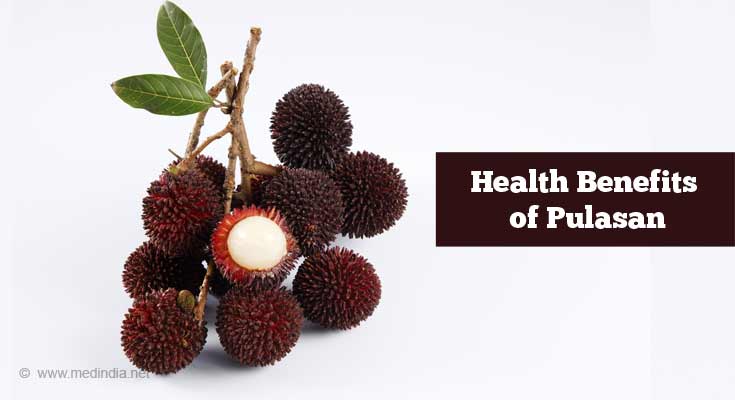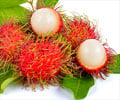What is Pulasan?
Pulasan fruit or Nephelium mutabile Blume is from a pulasan tree, which is an ornamental tree. It is also known as Kapulasan in Dutch. The flesh of the red tropical fruit is either eaten raw or made into a jam. The seeds of the exotic fruits are boiled or roasted to prepare a beverage resembling cocoa. The semi-deciduous plant is from West Malaysia and the delicious fruit is best when the fruit is reddest in color.
Pulasan is a tropical fruit, which is small, oval in shape with red, leathery skin, translucent in appearance and sweet flesh without any hint of sourness. These exotic fruits are dark red to light red or yellow in color and the rind is covered with short and stubby spines. It has one seed and the pulasan tree thrives best in a warm climate.

Nutrition Facts of Pulasan
Per 100 g of flesh of pulasan fruit contains about 84.54 percent to 90.87 percent of moisture and other nutrition benefits.
| Nutrients | Amount |
| Protein | 0.82 g |
| Carbohydrates | 12.86 g |
| Fiber | 0.14 g |
| Fat | 0.55 g |
| Calcium | 0.01-0.05 mg |
| Iron | 0.002 mg |
| Vitamin C | 11 mg |
Health Benefits of Pulasan
Traditionally, the leaves and roots are used in poultices; the decoction of roots is given as a febrifuge and vermifuge. A decoction of pulasan roots prepared with Gleichenia linearis is also used for bathing fever patients.
Some of the Pulasan Health Benefits are:
- Weight Loss: It helps you lose excess flab in your body and helps in maintaining a healthy body weight.
- Good for Diabetes: Pulasan fruit is used in managing blood sugar levels in diabetics. It is beneficial for both types of people who do not have enough insulin or those whose cells do not respond to the insulin produced in the cells.

- Good Source of Antioxidants: Pulasan is rich in antioxidant properties owing to the presence of vitamin C. Chemicals such as ascorbic acid, pyrogallol and hydroquinone enhance the antioxidant property of pulasan. Vitamin E and carotenoids are also responsible for the free radical scavenging property of the pulasan fruits.
- Skin and Hair Care Benefits: Pulasan makes skin softer and is also used in hair care. It has been proven in a study that a smoothie prepared from carrots and certain underutilized Malaysian tropical fruits such as pulasan can lead to a better complexion, glowing skin and health benefits as well. The oil obtained from the dried seeds and kernel yield about 74.9 percent of white fats which has a mild aroma and is also good for hair.

- Immune Booster: Pulasan is high in vitamin C, which is good for the immune system. Pulasan health benefits include healing of wounds and repairing of bones and teeth.
Pulasan Recipes
Potato and Pulasan Cutlet
Ingredients:
- 250 g potatoes, boiled and peeled
- 100 g minced beef
- 3 young kaffir lime leaves, finely sliced
- 1 tablespoon chopped coriander
- 1 medium-sized onion, peeled and chopped
- 1 tablespoon fried shallot crisps
- 1 pinch white pepper
- ¼ teaspoon salt, or to taste
- 6 pulasans, peeled and seeded
- 2 tablespoon flour
- 300 ml oil
- 1 egg beaten
Preparation:
Mash the potatoes and mix with minced meat. Leaving aside pulasan and egg, mix all the other ingredients. Take this mixture and shape in the form of cutlet around the pulasan in the center; and, coat lightly with flour. Heat oil in a wok, and dip the cutlets into the beaten eggs and deep fry till the color changes to a golden crown. Serve hot.
Health Tips
How to Differentiate between Rambutan and Pulasan?
Pulasan is a close relative of rambutan. The skin of pulasan is twice as thick as that of rambutan and the hair is also shorter in size. The rubber of pulasan is soft, the flesh does not stick to the seed and the taste is also sweeter with no hint of sourness.
How to Use Pulasan?
Pulasan fruits are generally eaten fresh, but can also be frozen or dried. They may also be eaten in the form of jams, jellies, sauces and alcohol. Pulasan fruit is used for flavoring in ice creams and puddings.







